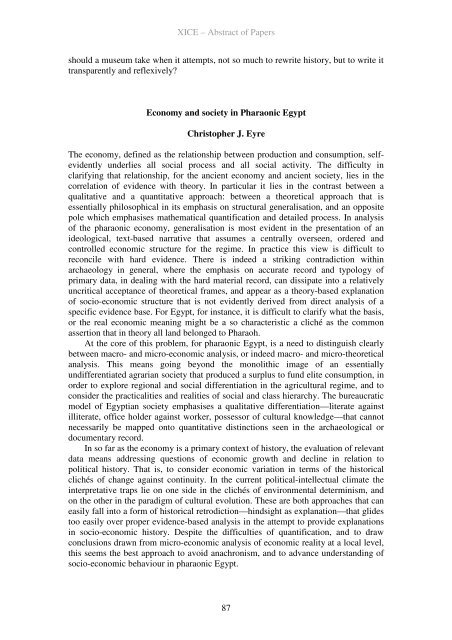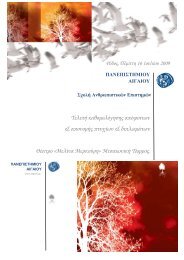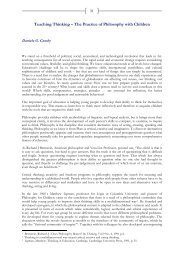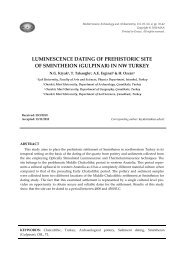Tenth International Congress of Egyptologists Abstracts of Papers
Tenth International Congress of Egyptologists Abstracts of Papers
Tenth International Congress of Egyptologists Abstracts of Papers
You also want an ePaper? Increase the reach of your titles
YUMPU automatically turns print PDFs into web optimized ePapers that Google loves.
XICE – Abstract <strong>of</strong> <strong>Papers</strong><br />
should a museum take when it attempts, not so much to rewrite history, but to write it<br />
transparently and reflexively?<br />
Economy and society in Pharaonic Egypt<br />
Christopher J. Eyre<br />
The economy, defined as the relationship between production and consumption, selfevidently<br />
underlies all social process and all social activity. The difficulty in<br />
clarifying that relationship, for the ancient economy and ancient society, lies in the<br />
correlation <strong>of</strong> evidence with theory. In particular it lies in the contrast between a<br />
qualitative and a quantitative approach: between a theoretical approach that is<br />
essentially philosophical in its emphasis on structural generalisation, and an opposite<br />
pole which emphasises mathematical quantification and detailed process. In analysis<br />
<strong>of</strong> the pharaonic economy, generalisation is most evident in the presentation <strong>of</strong> an<br />
ideological, text-based narrative that assumes a centrally overseen, ordered and<br />
controlled economic structure for the regime. In practice this view is difficult to<br />
reconcile with hard evidence. There is indeed a striking contradiction within<br />
archaeology in general, where the emphasis on accurate record and typology <strong>of</strong><br />
primary data, in dealing with the hard material record, can dissipate into a relatively<br />
uncritical acceptance <strong>of</strong> theoretical frames, and appear as a theory-based explanation<br />
<strong>of</strong> socio-economic structure that is not evidently derived from direct analysis <strong>of</strong> a<br />
specific evidence base. For Egypt, for instance, it is difficult to clarify what the basis,<br />
or the real economic meaning might be a so characteristic a cliché as the common<br />
assertion that in theory all land belonged to Pharaoh.<br />
At the core <strong>of</strong> this problem, for pharaonic Egypt, is a need to distinguish clearly<br />
between macro- and micro-economic analysis, or indeed macro- and micro-theoretical<br />
analysis. This means going beyond the monolithic image <strong>of</strong> an essentially<br />
undifferentiated agrarian society that produced a surplus to fund elite consumption, in<br />
order to explore regional and social differentiation in the agricultural regime, and to<br />
consider the practicalities and realities <strong>of</strong> social and class hierarchy. The bureaucratic<br />
model <strong>of</strong> Egyptian society emphasises a qualitative differentiation—literate against<br />
illiterate, <strong>of</strong>fice holder against worker, possessor <strong>of</strong> cultural knowledge—that cannot<br />
necessarily be mapped onto quantitative distinctions seen in the archaeological or<br />
documentary record.<br />
In so far as the economy is a primary context <strong>of</strong> history, the evaluation <strong>of</strong> relevant<br />
data means addressing questions <strong>of</strong> economic growth and decline in relation to<br />
political history. That is, to consider economic variation in terms <strong>of</strong> the historical<br />
clichés <strong>of</strong> change against continuity. In the current political-intellectual climate the<br />
interpretative traps lie on one side in the clichés <strong>of</strong> environmental determinism, and<br />
on the other in the paradigm <strong>of</strong> cultural evolution. These are both approaches that can<br />
easily fall into a form <strong>of</strong> historical retrodiction—hindsight as explanation—that glides<br />
too easily over proper evidence-based analysis in the attempt to provide explanations<br />
in socio-economic history. Despite the difficulties <strong>of</strong> quantification, and to draw<br />
conclusions drawn from micro-economic analysis <strong>of</strong> economic reality at a local level,<br />
this seems the best approach to avoid anachronism, and to advance understanding <strong>of</strong><br />
socio-economic behaviour in pharaonic Egypt.<br />
87






